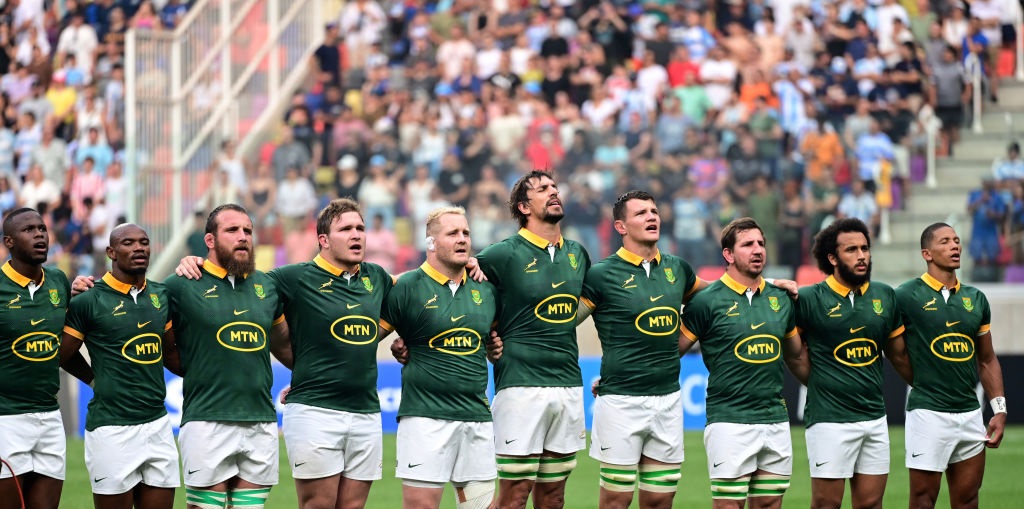Rassie Erasmus has an old problem to solve

Six years ago Rassie Erasmus had a problem to solve. He’d only been in charge of the Springboks for 10 games at that point and had started Faf de Klerk at scrum-half in nine of them. The former Lions half-back had built a reputation in Johannesburg as a dashing runner, but after his move to Sale Sharks he’d added guile and metronomic discipline to his game. Erasmus had clearly recognised that the man with the blonde mop would be key to his World Cup aspirations.
But for the first assignment of his European tour at the end of 2018, de Klerk was unavailable as the match against England fell outside of the allocated Test window. English clubs were not obligated to release their players and Sale weren’t doing South Africa any favours. This presented a problem.
In a position synonymous with great Springboks such as Joost van der Westhuizen and Fourie de Preez, the depth of talent at 9 looked rather thin. The options included the Bulls duo of Ivan van Zyl and Embrose Papier, as well as the Sharks captain Louis Schreuder. All were handy players but at the time they had a mere eight Test caps between them and had spent a combined 122 minutes on the park for their country. With just a year to go before the World Cup in Japan, Erasmus needed to cram minutes into their legs.
In the end none of the three rookies made the World Cup squad. De Klerk, 27 at the time, returned to the hot seat but was still relatively inexperienced with 25 caps before the tournament opener against New Zealand. In support, he had Cobus Reinach – a well-travelled 29-year-old but one with only a dozen appearances for South Africa – and Herschel Jantjies – a baby-faced 23-year-old who exploded onto the scene with two tries on debut against the Wallabies.
We all know how this story ends. Though Jantjies is no longer front and centre, de Klerk and Reinach rule the roost at scrum-half for the Boks. They have 58 and 35 Test caps respectively, own two World Cup winner’s medals and have established themselves as modern legends.
But here’s the dilemma. De Klerk is 33 and will be 36 at the next World Cup. Reinach is 34 and will be 37 when the team defends their title in Australia in 2027. At least one of them will be watching the tournament from their home. There’s a good chance that both will be sitting on the sofa.
Who is the next scrum-half off the rack? Clearly Erasmus isn’t so sure himself. He’s selected Jaden Hendrikse for the Rugby Championship decider in Mbombela this weekend. That makes it five scrum-halves selected to start in 10 Tests so far this year.
De Klerk started against an abject Welsh side in London before wearing the number nine jersey in both Tests against Wales. Reinach has started four times against four different opponents. Grant Williams kicked off against the All Blacks in Cape Town having started on the bench on five previous occasions. Morne van Berg, having impressed off the wood against Portugal and Australia, struggled in the wet against the Wallabies in Brisbane.
Have any of these players set the house on fire? Has there been a performance from a South African scrum-half that has screamed confidence and surety at the base of the ruck? Not really. Which is why the two toppies (Afrikaaans slang for for someone long in the tooth) remain the incumbents. There just hasn’t been enough of a challenge from the upstarts.

None of them have been helped by South Africa’s new attacking system. It’s not that the nascent approach implemented by Tony Brown isn’t a good one. This year the Springboks are scoring higher on rucks won and ruck speed as compared to the previous three years. But they’re conceding far more ruck penalties and they’re struggling to get as much go-forward ball from carriers as they did under the old system. There have been signs that things will click, but so far continuity – perhaps the most important variable that a scrum half needs to be successful – has been in short supply with ball in hand.
The rotation at fly-half hasn’t helped either. An experienced 10 often assuages any shortcomings of a developing nine but there has been inconsistency at pivot as well. Sacha Feinberg-Mngomezulu looks the real deal but is still finding his feet. Handre Pollard has ice in his veins and is a Springboks legend, but has himself battled to locate his groove in this new attack. And Manie Libbok has barely played at all, racking up just 87 minutes in the green and gold since the World Cup.
Despite the evidence, Erasmus has shot down suggestions that his scrum-halves are struggling and has backed Hendrikse to stamp his mark against the Pumas.

“For a guy like Jaden who is starting this weekend, it is very exciting. It always is for the younger nines like Grant Williams and Jaden,” Erasmus said. “I actually think that a guy like Jaden will flourish in the way we want to play. He’s a natural footballer and I don’t think the game plan has impacted the performances of the nines and whoever said that I disagree with it.”
Who are we to argue with a double World Cup-winning coach? But if Hendrikse is off his game, and if Reinach off the bench can’t add to what’s come before, the discord will only grow louder an old problem will once again need solving.
Watch the highly acclaimed five-part documentary Chasing the Sun 2, chronicling the journey of the Springboks as they strive to successfully defend the Rugby World Cup, free on RugbyPass TV (*unavailable in Africa)




























































Rassie knows he needs to identify his top three or four scrumhalf candidates, give them exposure to test rugby, and start figuring out how they each fit with the team, and how they compare with each other. Then he needs to develop their experience as starters and replacements. The good news is that he has been doing exactly this.
Honestly, if he decided to just back Hendrickse as his starter with Williams as the versatile bench player, and give them each 30+ caps before the next RWC, that would work fine. He would also have pretty good backup in case of injury etc. But the good news is that he has already got a good group of nines into the Bok system, and up to speed with the culture, processes and structures.
I can't imagine that he has any real concerns about scrumhalves. He already has good choices and he has time.
Someone needs to write a strongly worded article about the boks woes at lock.
Today’s game highlights the problems at 9.
Lol
Yeah... Dont get to wrapped up in the problems Rassie has to solve. He's already way ahead of them. As always.
Way to many journalists coaches around here especially when it comes to the Springboks...Seems to me these coaches know more then the real team coach....just wasted my time reading this non-sense article
Well now you’ve learnt your lesson. Skim read DG articles, ignore Ben Smiths drivel, read all of Nick Bishop and John Cardinals output. Easy 😀
You bloody journalists never stop worrying about what Rassie needs to do or the problems he faces. Why not just sit back and enjoy the ride and revel in how the Boks find answers to the many issues they face. What the heck, he had a 37 yr old flank play hooker in the WC final for 78 mins and end up as Captain for last 15 mins? Anything else must seem arbitrary
Controversial articles get clicks.
Idiots like me gives clicks.
Like a moth to a flame.
What discord?
If you want to see discord look at NZ’s woes at 9/10. They’d love to have our “problem”.
I don’t agree with the sentiment in this article. Highlighting problems that don’t exist. In year one of a cycle everyone is supposed to be rebuilding in, except the boks. They must lose the oldies, play young ones, and have a >90% win ratio.
You can’t win!
Indeed.
Grant Williams was solid this year. I think he has definitely put his hand up.
It’s very clear that Rassie’s plan is to have an experienced scrum half in the mix. That was always going to be Faf or Cobus. Faf was off colour before he got injured which is why we’ve seen more of reinach than usual.
Morne got his break. Wasn’t convincing but he needed to be tried. He’s at the bottom of the pecking order in my view.
Jaden was injured. He’s looked solid being brought back in and had he not been injured may have nailed the full time role down by now. Which is why he’s being selected for the decider. And he’s fairly experienced in his own right.
There’s no crisis at scrum half. The challenge has been to give the long list of contenders an opportunity to sort out the pecking order. And having injuries in the mix. Injured players mostly lose momentum. And scrum half is imho one of those positions where time in the saddle is vital. Hence consistently Reinach and Williams (until he got injured).
The pecking order (based on this year’s consistency in form):
1. Grant Williams
2. Jaden Hendrikse
3. Cobus Reinach
4. Faf de Klerk
5. Morne VDB
Who’ve I missed (there’s so many of them). The URC is no doubt going to reveal another option at 9. Probably Jantjies and possibly Nohamba. He’s got to get a chance and I think he’s way better than Morne.
I repeat. There is no Crisis. Impending or otherwise. As you were.
But writers gotta write, commenters gotta comment and scrumhalves gotta (scrumhalf?) play. So we're all getting the practise we need for the big moments. Makes sense to me. Most important thing Daniel IMHO said was that Faf only really started to play so well was when he went to Sale, and while it's not exactly the same analogy, it might suffice here. By giving each scrummie as much playing time as possible, they're gaining the experience they need to work inside the 'plan'. Maybe that's why Rassie played Manie and Pollard in the wrong order last week to give the former some 'stress' experience and why he's got Arendse in today so he can get more 'proper' tackling experience (wait for the Northern Transvaal herd screaming light blue murder at the second - or both - of those windups. I'm just sharpening my pencil) and not let the side down with bad tackles and yellow cards.
I wonder if Nohamba is part of Rassie's plans? He does a lot of good things and can kick at goal
I think we will see him in the mix, especially as he can kick and slot in at 10. I think he needs another solid URC campaign under his belt. He’s also always smiling and would be amazing for the group of players. I think he’s better than Morné by a country mile, 9s for 2027 in no particular order:
Nohamba
Hendrikse
Williams
Faf - if he manages to hold back time..!
I hope so. Nohamba is a special player.
Great article. And in some ways a scrum half is just as important as the flyhalf. Slow service by the 9 smothers the attack.
Boks have traditionally liked to play off 9 but that may be shifting for this next WC cycle, what you cannot argue against is slow service for an attacking gameplan. It’s going to be interesting to see how the 9s I mentioned above develop their skills moving forward..